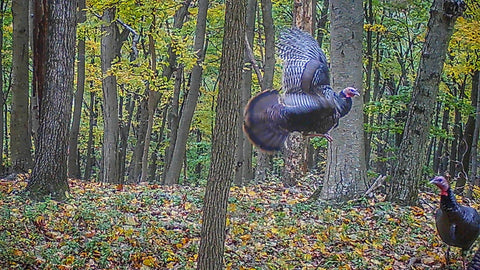4 Better Turkey Tactics When Nothing is Working

There's been a wide range of talk about the state of turkey populations across the country. We can be honest and say that we are not in the hay day of turkey hunting. It can often be a downright mental challenge to hunt in 85-degree humid weather and not hear one gobble. But for the die-hard thunder chicken nut, nothing is better than chasing gobbles.
Very little can compare to that sunrise gobbler noise. I'm not sure you're even alive if you hear it, and it doesn't make your heart thump.
In 2023 we need some fresh reminders of tactics that work and how we can get them to work for us this spring. So from me to you, here are a few tactics I always think about.
#1. Hunt in the Rain
In many forms of turkey hunting, rain is your friend. For public land, rainy days can be like magic. In part, it's due to the lack of hunting pressure, but mostly because rainy day gobblers are more predictable.
Turkeys hate the extra dripping under the foliage. They don't like when they can't hear, and they love the most open area they can find on a rainy day. Get to one of those spots before the rain ends, and trust the knowledge. If there are turkeys in the area, there is a good chance that they will show their face.
Call softly, they could be closer than you think, and if you're aggressive right off the bat, it's a good way to make them pass on that hot hen sound. Wet birds are often irritable and only willing to work with finesse. Take the gobbler's temperature and match the intensity.
#2. Know When to Leave or When to Stay
The first rule is don't leave turkeys to go looking for turkeys. If you've got one gobbling, keep working him at least until he quits talking. But what about toms that gobble and then stop talking altogether? Are those birds worth your time?
Knowing when to give up on a bird is a hard call, but remember, most often, a gobbler will always check out a hen noise at some point through the day. If a gobbler quits squawking, so should you. There's a chance he's with a hen, but he could just be shy. If you're the patient type and want nothing more than to put a bird on the ground, you shouldn't leave a spot where you had a turkey gobbling. That may mean you'll have to make a move on him another day if he doesn't show up in time. But at some point, he will show up where you were calling him from.

Waiting on a silent bird isn't everyone's thing. If that's you, don't wait, just have a good time. Give that bird 30 minutes and move on. Just be aware that you risk spooking that bird up for a few days if you stand up and he flies off.
#3. Skip the Silent Treatment
Listen, if you've got a tight timeline, skip the birds that don't care about your feelings. Maybe you've got a lot on your "honey do" list, or you're on a multi-state mission. With a set of good legs, you'll be able to catch a bird making a mistake.
Think about it this way, in every fishing tournament, someone always goes home a winner. Even if it was a tough day on the water, the fish had to be biting somewhere on the lake. The same is true of turkeys. Even on the closed lips type of day, there will be a tom that's willing to talk. If you cover enough ground, there's a good chance of finding him on that mediocre day.
#4. Think Before Calling

It's hard to refrain from yelping when you hear that bird firing off on the roost. Sometimes a little soft morning music is fine. But if you're anticipating a lot of activity from fellow hunters, you'll want to be the last to make noise at a talkative roosted gobbler. When he went to bed the night prior, there probably weren't eight different hens roosting in all directions of your bird. Turkeys are smart; they will know what's real and what's not when all the hunters start cackling. A seasoned bird will fly off the roost in the opposite direction of all the suspense and attempt to sneak in with the safety of ground cover.
Staying quiet or just a few soft clucks that you think he may not even hear can work to reel him right into your trap. Just do it immediately before you suspect he will fly off the roost. The best way to learn timing is hands-on experience, so you may fail a few times before finding success.
That's a Wrap
To tie this up with a bow on top, consider that there is more than one way to skin a cat. When we're talking turkeys, often experimenting until you find what makes them tick is the answer. There will be a time that takes longer than we'd like, but when you find something that works, stick with it! Soon enough, you'll put the flop on one!
Author: Aaron Hepler, Exodus Black Hat Team Member





